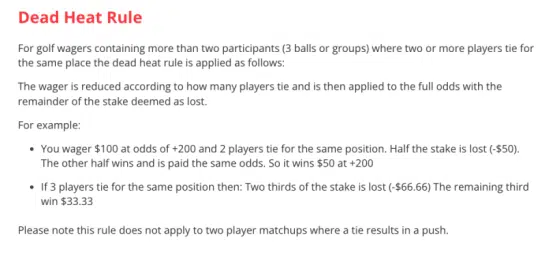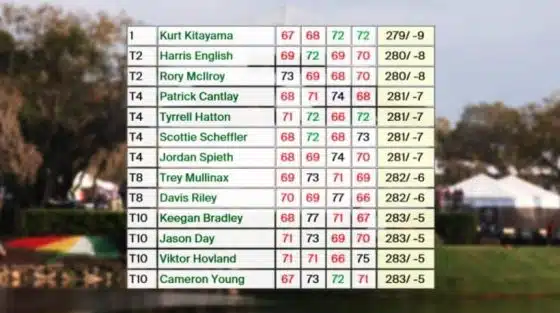Ross holds a First Class MA in Creative Writing from Plymouth University and has been a self-confessed sports nut his entire life. After just shy of a decade spent teaching in Asia, he channeled his passion for sports news and betting into a successful writing career. Now, with nearly a decade of experience in the industry, Ross's contributions are featured on esteemed platforms across the US and UK, including GiveMeSport and Fight Bananas. His expertise spans a wide array of sports, with a primary focus on the NFL, UFC, NBA, and soccer.
All posts by Ross BennellickDead heat betting occurs when two (or more) participants in an event, game, or race win—meaning there is more than one winner. This can often create confusion with respect to the winnings payouts – the most common being a dead heat in horse racing when two runners can’t be split at the finishing post.
With that in mind, our experts are on hand to guide you through every aspect of dead heat betting, from how it works to how the winnings are calculated at retail bookmakers and online sportsbooks.
- Show full guideShow less
Dead Heat Betting Explained – What Is It?
As a bettor, it’s vital to understand how dead heat can affect your wagers. We’ll explore how your bets are settled when a dead heat occurs and explore a couple of strategies that you should keep in mind to maximize your profits in the event of a dead heat.
A dead heat occurs when two or more participants in a sporting event finish in a tie and cannot be separated. This is seen with some major US sports for betting, such as horse racing, golf, and even soccer, especially in markets like top goal scorers.
For example, in horse racing, there could be a photo finish where two or more horses cross the line simultaneously, meaning a winner can’t be declared. In golf, multiple players can be tied at the top of the leaderboard, and in soccer, there can be multiple top scorers in a competition.
The average bettor would assume that all the major US sportsbooks would pay out in full regardless of any dead heats, but unfortunately, that is far from the case. If that were the case, it would require the sportsbook to pay out multiple winners, and in their eyes, that is unfair.
When you use sportsbooks, they’ll use terms like ‘dead heat rules apply,’ which means a dead heat will be declared in the event of a tie. Dead heats do not apply to markets where you can bet on a tie—such as the moneyline market for a soccer game, which allows you to bet on a home win, away win, or tie. A dead heat will not apply in the event of a draw.
Dead Heat Payouts Are Calculated Differently
To create as even of a playing field as possible for both the bettor and the sportsbook, dead heat rules involve the original stake being divided by the number of participants for the dead heat before being paid out at the original odds.
For example, suppose you back a horse at odds of +200 with a $100 bet, and it finishes in a dead heat with one other horse. In that case, the following rules apply: your original stake of $100 is divided by two (because there are two participants in this dead heat), and your winnings are calculated on a $50 stake at the same +200 odds—so you will profit $100.
How Does A Dead Heat In Betting Work?
The way that dead heats in betting work is quite simple and straightforward, but understanding every area of it can be somewhat confusing at first. So, we’ve made it easily digestible with a few concepts below.
For example, you placed a bet on the Kentucky Derby, and your horse finished in a dead heat for first place with one other. Let’s assume the horse’s odds were +500, and you wagered $50.
Because two Kentucky Derby horses are involved in the dead heat, we must divide our wager by the number tied, which is two.
- New stake = $50 / 2 = $25
Due to the dead heat, your bet is now worth $25 at the same +500 odds.
- Original bet = $50 x +500 = $300 ($250 profit)
- Dead heat rules applied = $25 x +500 = $150 ($125 profit)
As seen with the above example, we receive half as much profit in this scenario due to the dead heat rule that has been applied.
It’s worth underlining that the stake is adjusted based on the number of participants in the dead heat. For example, if there were five horses involved, the wager is divided by five, which means a $50 bet becomes a $10 bet.
Are The Dead Heat Returns In Betting Half The Odds Or Half The Stake?
The dead heat returns in betting are half the stake, not the odds. If you halved the odds, here’s how your returns would look:
- Example original bet = $10 x +1000 = $110 ($100 profit)
- Halving the odds = $10 x +500 = $60 ($50 profit)
- Halving the stake = $5 x +1000 = $55 ($50 profit)
Dead Heat Betting Returns – How To Calculate
The main thing to consider when calculating your returns from a dead heat bet is that the stake is going to be the variable that you need to adjust, not the betting odds.
There are four things needed to calculate:
- Original odds
- Original wager
- Number of participants in the dead heat
- Number of places remaining
Our simple formula to determine your payout is as follows:
- Number of places remaining / number of participants in the dead heat
Let’s use an example: If you backed a horse with $200 to win a race and it finishes in a dead heat with one other horse, that means there is one place up for grabs (winner) with two participants in the dead heat.
- 2/1 = 2
In this example, we need to divide our original wager ($200) by two to make an adjusted stake of $100.
What Are The Dead Heat Betting Rules?
Most offshore sportsbooks and racebooks adhere to the same rules regarding dead heats: the original stake is halved, and your winnings are paid out accordingly.
To evidence this, here are the dead heat betting rules on major US sportsbook BetOnline:
Example Of A Dead Heat In Betting Across Different Sports
A dead heat is the same in principle across various sports, but it can unfold slightly differently between each one.
Example Of A Dead Heat In Horse Racing
The race stewards at the racecourse will decide dead heats following the finish. Dead heats can also be applied to each-way bet types, and deductions are applied accordingly.
If a dead heat occurs for second place and first place is later disqualified for any reason, the horses involved in the dead heat are then promoted to winners.
Example Of A Dead Heat In Golf
In golf, a dead heat can be declared for any position other than a win – assuming a winner has been announced via a play-off. If a tournament is canceled due to weather, for example, before all rounds are finished – and no play-off is possible – dead heat rules will apply with the best golf betting sites.
You can see here that two players (Harris English and Rory McIlroy) are tied for second. There are also more tied players in fourth, eighth, and tenth.
Example Of A Dead Heat In Soccer
You won’t often see dead heats when soccer betting. This is because when you make a win/loss bet on the moneyline, regular league games have a third option to wager: the tie (or draw). So, in essence, the tie is your dead heat bet – but you will need to wager on the tie to win any cash.
In addition, in the soccer world, teams and players always end up separated by some metric. For instance, when Manchester United and Manchester City finished level on points at the top of the EPL in 2011/12, City were declared the champions because they had a superior goal difference of +8 vs. United over the course of the season. If you wagered on “United to win the 2011/12 EPL title,” you’d be holding a losing ticket in this instance.
The same generally goes for individual player outrights, too. In the 2012 European Championship, for example, Mario Gomez and Fernando Torres each scored three goals. Still, Torres was awarded the Golden Boot for having a better ‘minutes-per-goal’ ratio than Gomez across the tournament. Again, if you wagered on “Gomez to win the Golden Boot,” your luck is probably out (but always worth having a whine to customer support).
Example Of A Dead Heat In Athletics
Athletics sees many more dead heats than most sports do. It’s actually more common than you’d think in events like the Olympics, where they will award the same medal to two or more participants.
At the 2020 Tokyo Olympics, for instance, high jumpers from Italy and Qatar were in a jump-off for the gold medal before both men agreed to share the prize after multiple successful and failed attempts.
What Happens If There Is A 3-Way (Or More) Dead Heat In Betting?
This is extremely rare – but 3-way dead heats are possible in betting, and it’d be more common in sports like golf, where three participants might all end up on the same score at the top of the leaderboard.
For a three-way dead heat, the stake is divided by three because that’s how many participants are involved. If it were a four-way dead heat, you’d divide the stake by four, and so on.
How Does A Dead Heat Work With Each-Way Betting?
Each-way betting is not as common with US sportsbooks as it is in Europe, with most preferring to split the bet between singles of win and place. Some sportsbooks, however, allow you to bet each way, which can be a useful tactic at the track or bookmakers.
An each-way bet is simply two bets in one—the first part is for the horse to win, and the second is for it to place. The odds for the horse to place are always a fraction of the win bet, and they’re normally around a quarter or fifth of the original odds, depending on how many runners there are.
If your horse finishes in a dead heat for a place but fails to win the race – there is no need to adjust your stake because the horse finished within the original positions. If the place bet includes the top four and your horse finishes in a dead heat for third, you don’t need to take any action.
A dead heat only comes into play if three horses finish in a tie for third if there are four places on offer, for example. This would then mean that there are three horses tied for only two places.
Using the same formula we explained above – number of places remaining / number of participants in the dead heat.
- 2/3 = 0.66
This is two-thirds of your original wager or 66 cents to the dollar. This adjustment is applied to the each-way portion of your bet. If you wagered $10 each way (total risk $20), your $10 on the win is settled as a loser, and your remaining $10 on the place is adjusted to $6.66.
Try out dead heat betting with the best horse racing betting sites.
Dead Heat Betting – The Final Word
In conclusion, we hope our Dead Heat Betting Guide has equipped you with the fundamentals required to navigate tie finishes with confidence when betting online. If you have any additional queries, hopefully, the FAQ section below will address them.
FAQs
What is a dead heat reduction?
A dead heat reduction is the technical name given to the process by which a bookmaker halves your stake in the event of a tied finish. This means that the original payout, as seen on your bet slip when you placed the wager, would also be halved.
How to determine how an individual sportsbook handles dead heats?
Where dead heats occur, most sportsbooks follow the same basic rules: dividing the stake by the number of teams/players tied. That said, it always pays to double-check with your sportsbook that there are no variations. To do this, just head to the platform’s House Rules section, such as here for golf at BetOnline. UK bettors using betting sites not on Gamstop should also review the specific rules on dead heats for these platforms.
How often do dead heats happen in horse racing?
Thanks in no small part to advancements in technology–better cameras, zoom, panoramic technology, etc.–we don’t see as many dead heats in horse racing as we used to. But, to be fair, dead heats have always been uncommon. In fact, according to Wikipedia, there have only been 76 recorded dead heat finishes in horse racing since 1806! This works out to approximately one dead heat every three years on average.
Share this page
Ross BennellickSports EditorFollow on
Ross holds a First Class MA in Creative Writing from Plymouth University and has been a self-confessed sports nut his entire life. After just shy of a decade spent teaching in Asia, he channeled his passion for sports news and betting into a successful writing career. Now, with nearly a decade of experience in the industry, Ross's contributions are featured on esteemed platforms across the US and UK, including GiveMeSport and Fight Bananas. His expertise spans a wide array of sports, with a primary focus on the NFL, UFC, NBA, and soccer.
All posts by Ross BennellickRoss Bennellick Sports EditorRoss holds a First Class MA in Creative Writing from Plymouth University and has been a self-confessed sports nut his entire life. After just shy of a decade spent teaching in Asia, he channeled his passion for sports news and betting into a successful writing career. Now, with nearly a decade of experience in the industry, Ross's contributions are featured on esteemed platforms across the US and UK, including GiveMeSport and Fight Bananas. His expertise spans a wide array of sports, with a primary focus on the NFL, UFC, NBA, and soccer.
All posts by Ross Bennellick




